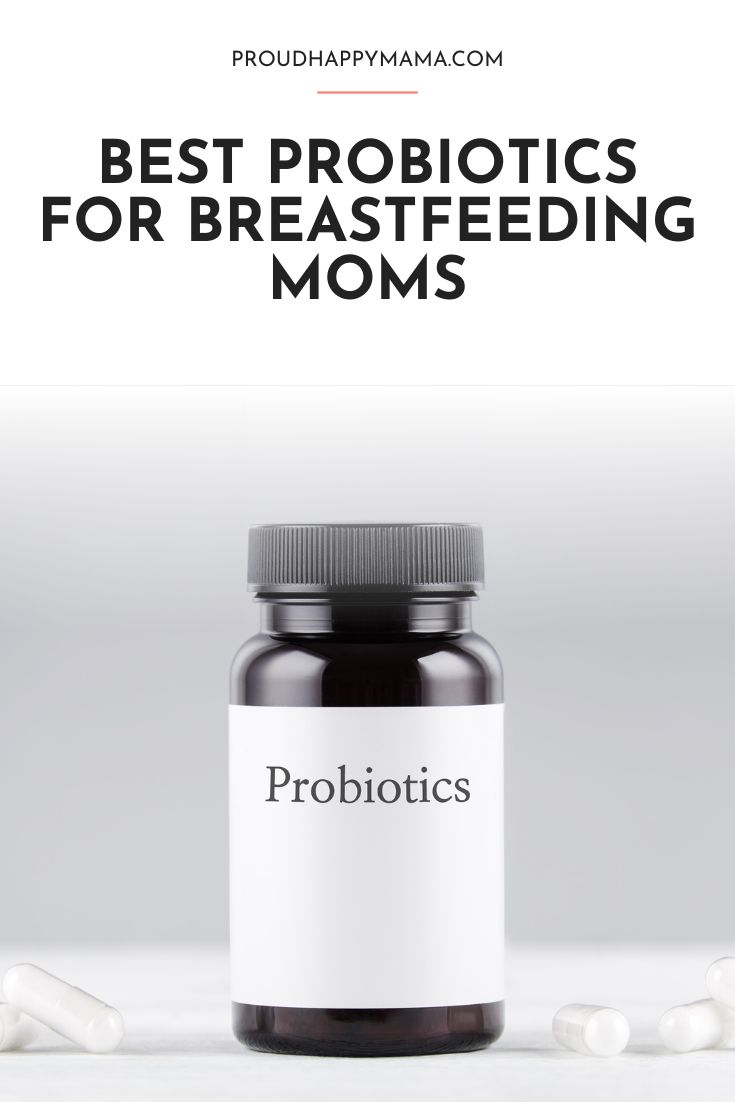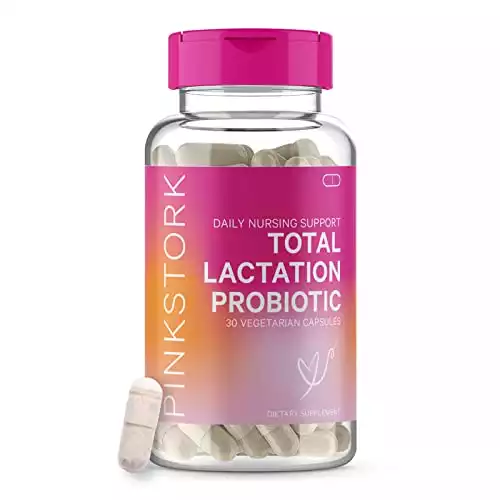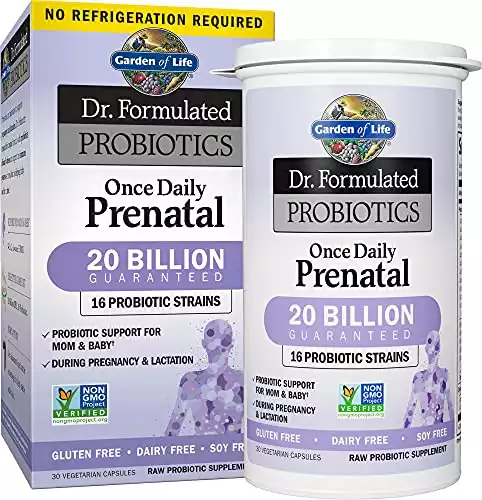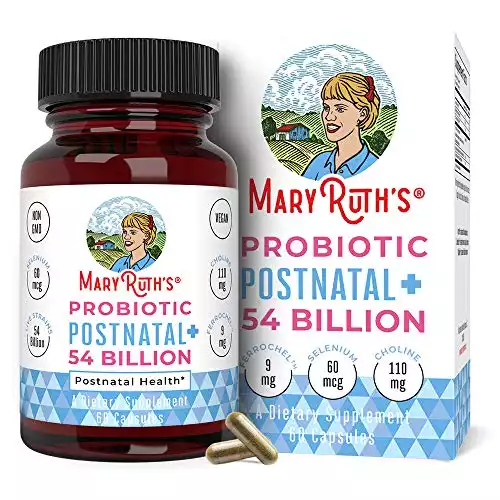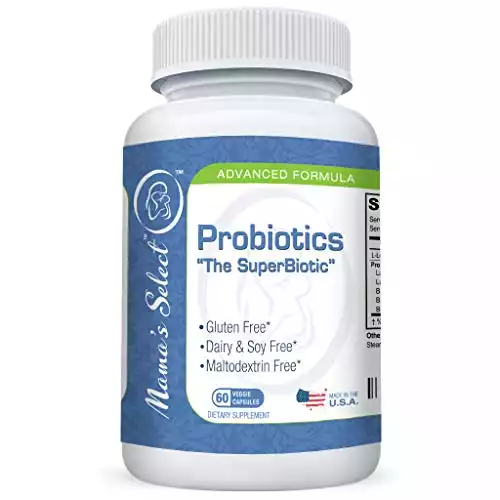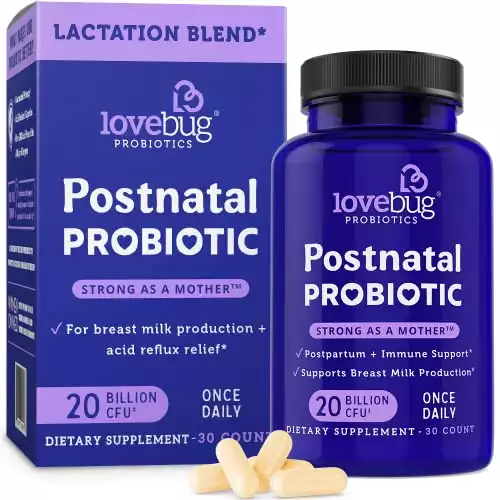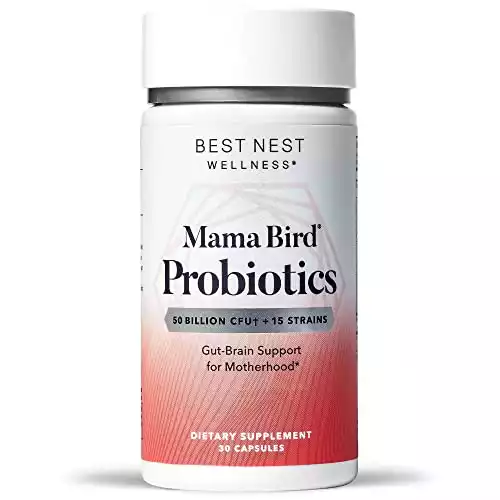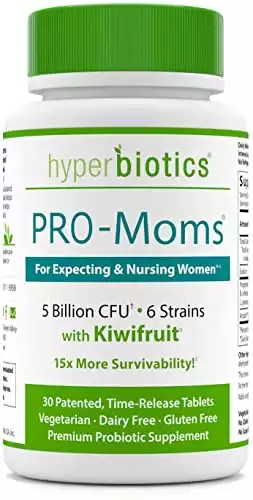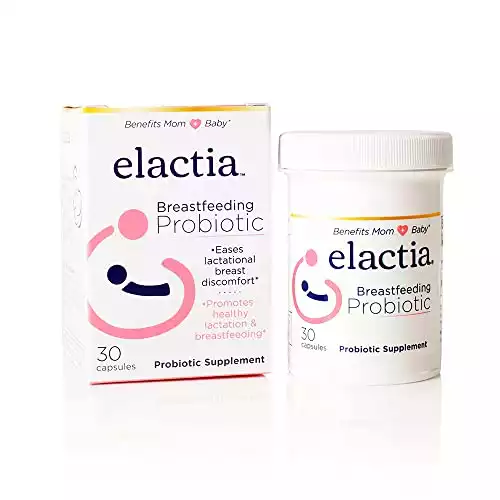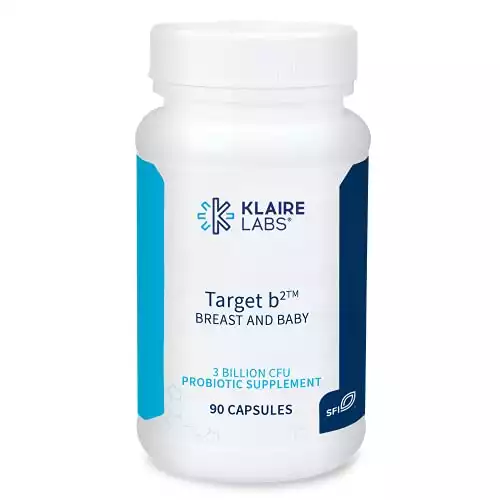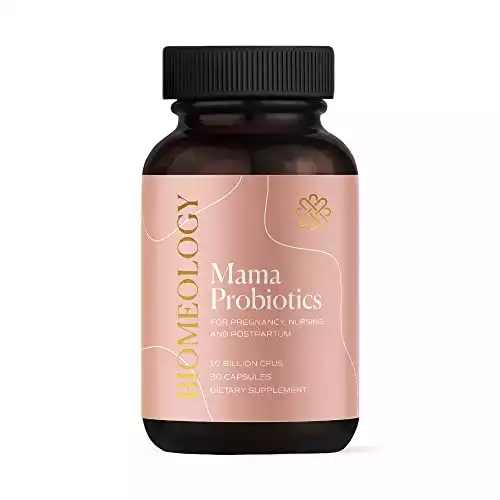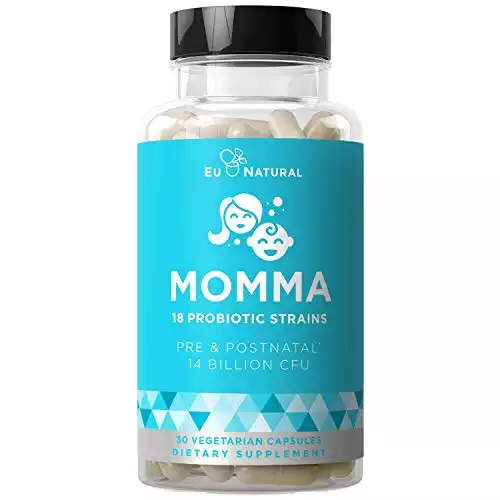Best Probiotics for Breastfeeding Moms
Are you looking for the best probiotics for breastfeeding moms to give your body a boost? Then let me help with my ultimate guide on the best probiotics to take while breastfeeding!
I breastfeed for 5 years! So, I understand more than most that part of maintaining your baby’s wellness is taking care of your own health.
That’s where probiotics can help! They are a great way to help keep your gut healthy and help your body digest food.
After all, fueling your body with the necessary nutrients can help you produce healthy breast milk for your newborn.
However, not all probiotics are created equal, so you want to use the best brands that are safe while breastfeeding.
In this guide, I’ve reviewed the best probiotics to take while breastfeeding, including their features, pros, and cons so you can find probiotics for breastfeeding you’ll love!
This post contains affiliate links. See our full disclosure here
This probiotic is hands down our favorite for breastfeeding moms for all the right reasons!
It promotes postpartum wellness, digestion, gut health, and vaginal health. Additionally, it strengthens your and your baby’s immune systems.
Each capsule contains 10 billion CFUs of Lactobacillus, and Bifidobacterium.
It also free of gluten, wheat, dairy, soy, GMOs, and other allergens.
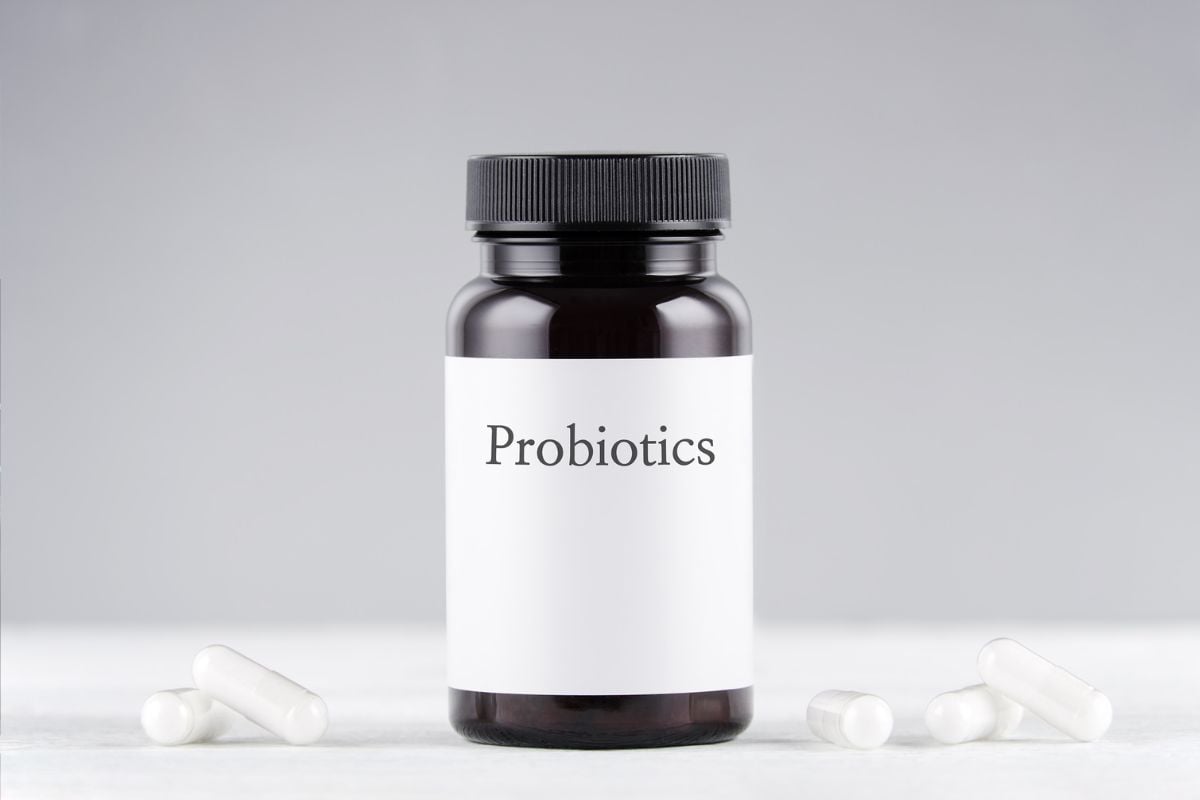
Benefits of Probiotics for Breastfeeding Moms
Breastfeeding affects a mom’s gut health because breast milk has different things that help both the mom and the baby. This connection influences the mom’s overall health, like how she digests food, how her body uses energy, and how strong her body’s defense system is.
Breastfeeding itself helps keep the gut healthy, but using probiotics can make it even better.
Probiotics, especially kinds like Lactobacillus and Bifidobacterium, can help with digestion, make the defense system stronger, and make the time after giving birth more comfortable.
Studies show that probiotics can do these things by looking at the body’s defense signals, making the mix of helpful microbes in the gut better, and helping moms feel better postpartum.
The way breastfeeding and probiotics work together is really important for both the mom’s health and making sure the baby’s gut grows well.
There is also some evidence that probiotic supplements may be an effective alternative to antibiotics for the treatment of mastitis.
List of 11 Best Probiotics for Breastfeeding Moms
Best Probiotic For Breastfeeding Moms
Here are my top picks for probiotic supplements for breastfeeding moms seeking an additional boost to their gut health!
1. Pink Stork Total Lactation Probiotic
Best Overall Probiotic for Breastfeeding Moms
This probiotic while breastfeeding is hands down one of my favorite for all the right reasons! It promotes postpartum wellness, digestion, gut health, and vaginal health. Additionally, it strengthens your and your baby’s immune systems.
With the Pink Stork probiotic, you get 30 capsules, each having 10 billion CFUs of Lactobacillus, and Bifidobacterium. It also happens to be free of gluten, wheat, dairy, soy, GMOs, and other allergens.
This product also contains Enterococcus faecium, a microbe that can help to maintain a healthy gut environment. For example, it improves immune cell function, modulates cell proliferation, and increases fat-burning ability.
Many people found the Pink Stork probiotic to be effective in alleviating infant colic symptoms. This is because it includes a high count of Bifidobacterium, which has shown benefits in reducing newborn crying time.
Lastly, the advised dosage for this product is one capsule per day.
Pros
- Helps with digestion issues of both mother and baby.
- Regulates breast milk production.
- Has a pleasant scent and flavor.
- Relieves mastitis symptoms.
- Woman-owned and run brand
Cons
- A bit costly compared to other products.
This probiotic is hands down our favorite for breastfeeding moms for all the right reasons!
It promotes postpartum wellness, digestion, gut health, and vaginal health. Additionally, it strengthens your and your baby’s immune systems.
Each capsule contains 10 billion CFUs of Lactobacillus, and Bifidobacterium.
It also free of gluten, wheat, dairy, soy, GMOs, and other allergens.
2. Garden of Life Dr. Formulated Probiotics
Best for Vegetarians
The Garden of Life probiotic is suitable for both pregnant and nursing mothers. It’s gluten-free, soy-free, and non-GMO. Additionally, it contains 15 billion CFUs and 11 strains of Lactobacillus. It also has five billion CFUs and five strains of Bifidobacterium.
This vegetarian-friendly product is both a probiotic and a prebiotic supplement, including 115mg of organic potato and acacia prebiotic fiber. This helps feed and generate good bacteria in the gut.
Furthermore, the Garden of Life probiotic features Lactobacillus acidophilus and Bifidobacterium lactis. These two probiotic strains have been shown to significantly improve immunological function.
Just like the Pink Stork Total Lactation, the recommended dose for the Garden of Life probiotic is one tablet daily.
Pros
- Relieves unpleasant gastrointestinal symptoms.
- Helps with yeast infections.
- Easy to swallow.
- Helps with infant reflux issues.
Cons
- Could cause constipation for some people.
3. MaryRuth’s Postnatal Probiotic
Best for Vegans
The MaryRuth pine-based probiotics are high in vitamins, antioxidants, and minerals.
These supplements contain 54 Billion CFU per serving. Each pill consists of Lactobacillus, Bifidobacterium, Selenium, Choline, and Iron.
One great thing about this product is that it contains organic ashwagandha root, which can help regulate the endocrine system. This results in stress alleviation and faster sleep, which new moms desperately need!
However, the most important aspect of this probiotic is that it’s vegan. Given that the majority of probiotic foods aren’t vegan, this is a big plus. It’s also free of gluten, wheat, corn, soy, nuts, dairy, and sugar.
If you go for this one, you can take two capsules per serving.
Pros
- Regulates newborns’ bowel movements.
- Improves moods.
- Helps regulate sleep cycles.
- Can strengthen hair.
Cons
- Has a fishy smell and flavor.
4. Mama’s Select Probiotics for Pregnant & Breastfeeding Women
Best Budget Pick
The Mama’s Select probiotic promotes a healthy intestinal system in moms and newborns. It helps with constipation, diarrhea, gas, and bloating. It’s also free of gluten, dairy, peanuts, tree nuts, and fish.
Furthermore, Mama’s Select probiotics help in the production of “short-chain” fatty acids, which protect against inflammation and improve general gut health.
The product comes with 60 pills, with a dosage of one capsule per day. Most products come with half the amount for the same price, which gives this product a bonus point!
Each pill contains 10 billion CFUs and nine distinct probiotic strains of Lactobacillus and Bifidobacterium.
Lastly, this probiotic contains Lactobacillus gasseri. This strain has been linked to several health advantages, including the prevention of vaginal inflammation and gastric ulcers. L. gasseri also reduces symptoms of IBD and IBS.
Pros
- Helps with UTIs.
- Easy to swallow.
- Good value for money.
- Regulates newborns’ bowel movements.
Cons
- Side effects may cause stomach pain and flatulence in newborns.
5. Lovebug Postnatal Probiotic
Best for Milk Production
The Lovebug probiotics contain a lactation combination of fenugreek seed, milk thistle, and fennel seed. This blend can promote milk production and alleviate acid reflux symptoms.
With this product, you’ll be getting 30 capsules, with the suggested dosage being one capsule per day. It contains 20 billion CFUs and a multi-strain formula of Lactobacillus and Bifidobacterium.
Furthermore, the Lovebug probiotic has no GMOs or fillers. It also doesn’t contain any artificial ingredients, colors, or flavors.
The Lovebug probiotic contains fenugreek, a galactagogue that successfully increases milk supply. That said, other studies show that fenugreek may decrease breastmilk supply in some women.
Although the cause of this is unknown, it could be related to the estrogenic qualities of fenugreek. As usual, it’s best to consult your physician before using a probiotic that contains fenugreek.
Pros
- Good for thrush in newborns.
- Helps with gas and constipation.
- Can reduce newborn colic.
- Eases acid reflux symptoms.
Cons
- Pills are slightly big and may be difficult to swallow.
6. Best Nest Wellness Mama Bird Probiotics for Women
Best for Mood Boosting
Mama Bird’s vegan and gluten-free probiotics claim to improve digestion and regularity. With 50 billion CFUs, these probiotic capsules are acid-resistant, which ensures that the probiotic strains can tolerate digestive acid to reach your intestines successfully.
All in all, this product can be great for mood disorders because it contains 15 different strains of Lactobacillus and Bifidobacterium. Among these are L. brevis and L. plantarum. These three strains have been shown to produce serotonin, which is also known as the happy hormone!
Furthermore, it doesn’t contain any artificial colors or flavors. It’s also free from yeast, soy, GMOs, and nuts. Finally, it has 30 capsules, with a dosage of one per day.
Pros
- Easy to swallow.
- Doesn’t have an aftertaste.
- Helps boost overall mood.
- Relieves symptoms of UTIs.
Cons
- May trigger constipation in some people.
7. Hyperbiotics Pro Moms Probiotics For Women
Best for Sensitive Stomachs
The Hyperbiotics supplements aim to help pregnant and lactating mothers by boosting nutrient absorption and reducing gastrointestinal discomfort. It has five million CFUs and six distinct probiotic strains.
This product contains Lactobacillus plantarum, which helps produce folate in both mom and baby. As you might know, folate production is vital during lactation because it promotes both the mother’s physiological changes and the baby’s development.
It also includes natural prebiotics derived from kiwifruit powder extract, which can help relieve abdominal pain as well as increase bowel movements.
In addition to containing kiwifruit powder, this probiotic is free of artificial flavors and high CFUs, both of which can irritate people with sensitive stomachs. It’s also gluten-free, vegetarian, and non-GMO.
The recommended dose for this product is one tablet per day.
Pros
- Helps with constipation.
- Promised to regulate digestion during and after pregnancy.
- Boosts energy.
- Patented BIO-tract delivery that protects probiotics from stomach acid.
Cons
- Pills aren’t coated and might be hard to swallow.
8. Elactia Breastfeeding Probiotic
Best for Breast Health
The Elactia probiotic supplement is all about breast comfort. Because it’s single-strained, you get three billion CFUs of Lactobacillus fermentum only.
Although a multi-strain probiotic is preferred, having such a high concentration of L. fermentum might be good for mothers experiencing breast pain. This is because the strain significantly improves breast health and reduces breast discomfort during lactation.
This package contains 30 tablets to last 30 days. Plus, the Elactia probiotic is gluten-free, non-GMO, and devoid of artificial colors and flavors.
Pros
- Relieves mastitis symptoms.
- Reduces breastfeeding discomfort.
- Helps regulate milk flow.
Cons
- May take time to start showing effects.
9. Klaire Labs Target B2 Breastfeeding Probiotic
Best for Mastitis
The gluten-free Klaire Labs probiotic can be taken by both pregnant and lactating women.
Just like the Elactia probiotic, this one has three billion CFUs of Lactobacillus fermentum, but with a kick of potassium.
Overall, it can boost milk production and minimize breast pain. It also claims to reduce the number of staphylococcus aureus, which is a common cause of mastitis around the world.
The Klaire Labs probiotic supplement is free of fish, shellfish, nuts, peanuts, eggs, wheat, and soybeans. It also doesn’t contain any artificial colors or flavors, and the suggested dosage is one to three capsules per day.
Pros
- Relieves mastitis discomfort.
- Helps with milk production.
- Can reduce clogged ducts.
- Suitable for pregnant women in the third trimester, too.
Cons
- Contains maltodextrin, which may trigger SIBO symptoms.
10. Biomeology Probiotics for Breastfeeding
Best for Postpartum Mood Disorders
The Biomeology probiotic improves gut health and immunological function throughout pregnancy, postpartum, preconception, and nursing. It comes in a pack of 30 capsules, each containing 10 billion CFUs of Lactobacillus rhamnosus and Bifidobacterium.
This probiotic is vegan and free of tree nuts, soybeans, peanuts, celery, and wheat. Additionally, L. rhamnosus and Bifidobacterium help reduce symptoms of postpartum mood disorders, such as postpartum depression and anxiety.
You should take one capsule of the Biomeology probiotic per day.
Pros
- Helps boost milk production.
- Reduces acid reflux in babies.
- Helps with pregnancy nausea and constipation.
- Regulates bowel movements.
Cons
- Pricey.
11. Eu Natural Momma Prenatal Probiotics
Best for Gut Inoculation
This Eu Natural Prenatal probiotic comes in a package of 30 vegetarian herbal-flavored pills. These supplements function as pre and probiotics and should be consumed once a day before a meal.
The gluten-free supplements contain 14 billion CFUs and 18 strains of Lactobacillus, Bifidobacterium, Lactococcus, and Saccharomyces boulardii.
Eu Natural’s probiotics can be a suitable choice for nursing mothers who have been on long-term antibiotics. This is because S. boulardii is antibiotic-resistant, which makes it an effective ingredient for stomach inoculation.
Furthermore, the Momma’s probiotic is resistant to digestive acids, allowing it to travel through the intestines more easily. Lastly, it doesn’t contain any allergens, binders, fillers, or artificial additives.
Pros
- Easy to swallow.
- Moms found it to help with nausea.
- Part of Eu Natural’s 1-for-1 Vitamins Match initiative.
- Not tested on animals.
Cons
- Side effects caused bloating and flatulence in some women.
Buyer Guide On Safe Probiotics For Breastfeeding Moms
When it comes to picking the right probiotics, there are some important things to think about. These factors can help you choose probiotics that work well for you and your baby.
Here’s what you need to consider:
1. CFUs (Colony-Forming Units)
CFUs, or colony-forming units, simply refer to the amount of live and active microorganisms included in each serving of your probiotic.
However, it’s difficult to determine what constitutes an “adequate” CFU count. This is because the right CFU count varies from one case to another.
Generally speaking, a high-quality probiotic should typically include between 1 and 10 billion CFU for each strain indicated on the label.
2. Types of Probiotic Strains
Before you grab a probiotic, you’ll need to check if the probiotic strains match your needs.
Some of the best probiotics for breastfeeding will contain at least one of these two most researched and well-known probiotic bacteria:
Lactobacillus
Lactobacillus has dozens of strains, each of which is useful in a different way. For example, L. fermentum, like in the Elactia probiotic, is known to alleviate breast pain and mastitis symptoms.
Another example is the L. rhamnosus, which is in the Biomeology probiotic. This strain helps reduce symptoms of postpartum mood disorders.
Bifidobacteria
Bifidobacterium, which you can find in the Pink Stork probiotic, is a good strain to consider, especially if your baby is showing signs of colic.
Furthermore, Bifidobacterium is also helpful if you’re undergoing postpartum anxiety. Studies show that it can reduce physiological distress, negative thoughts, and overall depression.
3. Storage Recommendations
When it comes to storage recommendations, there are two main types of probiotic supplements: refrigerated and non-refrigerated. Although all the products we picked are shelf-stable, they should still be stored in a cool, dry place.
After all, any heat, humidity, or moisture can destroy the probiotic bacteria in the supplement, rendering it ineffective.
Some products even have a recommended storage temperature. For instance, the Klaire Labs Target B2 requires 59-85°F.
So, it’s better to keep the ideal conditions and the average temperature where you live in mind before picking a probiotic.
4. Ingredients
The majority of probiotics are devoid of main allergens, including gluten, soy, eggs, dairy, or lactose. Nonetheless, some people can be particularly sensitive to probiotics. So, be cautious and double-check the ingredient list.
Additionally, some probiotics use inactive ingredients for flavors and scents, ultimately for a better experience. This sounds good, right? Well, not always.
Although probiotics containing artificial flavors are considered safe, they may cause an allergic reaction in rare cases. If that applies to you, it could be best to go for a flavorless probiotic, like the Lovebug or the Mama’s Select probiotics.
As always, you’ll need to stop taking the pills if you notice any signs of allergy or rash.
5. Dosage
Some supplements, such as the Elactia probiotic, require a dosage of one pill per day. Other products, like MaryRuth’s probiotic, suggest two capsules per serving.
Generally speaking, the suggested dose for adults ranges between 10 to 20 billion CFUs per day. Nevertheless, always check the product label to ensure that you’re not consuming too much or too little.
6. Allergies and Sensitivities
If you or your baby have allergies or sensitivities, it’s important to choose probiotics that don’t have any harmful ingredients.
Read the label carefully to make sure they’re safe for both of you.
Remember, everyone’s body is different, so what works for one person might not work for another. Pay attention to how your body reacts to the probiotics and give it some time to see if they make a positive difference.
By considering these factors and consulting a healthcare provider, you can make an informed choice that supports your health and your baby’s well-being.
This probiotic is hands down our favorite for breastfeeding moms for all the right reasons!
It promotes postpartum wellness, digestion, gut health, and vaginal health. Additionally, it strengthens your and your baby’s immune systems.
Each capsule contains 10 billion CFUs of Lactobacillus, and Bifidobacterium.
It also free of gluten, wheat, dairy, soy, GMOs, and other allergens.
Dietary Sources of Probiotics for Breastfeeding Moms
Whilst you can boost your probiotic intake with a supplement, there are also so great natural foods you can eat to increase your probiotic supply from your diet while breastfeeding.
Here are some natural food sources that are rich in probiotics:
Yogurt: Yogurt is a well-known source of probiotics. Look for yogurt labeled with live and active cultures, as these contain beneficial bacteria that can help your gut.
Kefir: Similar to yogurt, kefir is a fermented dairy product that contains various probiotic strains. It’s like a drinkable yogurt and can be a tasty addition to your diet.
Sauerkraut: Sauerkraut is fermented cabbage and a good source of probiotics. Make sure you choose unpasteurized sauerkraut, as pasteurization can kill the beneficial bacteria.
Kimchi: Kimchi is a spicy fermented cabbage dish popular in Korean cuisine. Like sauerkraut, it contains probiotics and can add a flavorful kick to your meals.
Fermented Pickles: Traditional pickles made through fermentation, not vinegar, can provide probiotics. Check the label to ensure they are naturally fermented.
Miso: Miso is a Japanese seasoning made from fermented soybeans. It’s commonly used in soups and sauces and offers a source of probiotics.
Tempeh: Tempeh is a fermented soy product that’s rich in probiotics. It’s a versatile ingredient that can be used in various dishes.
Non-Dairy Alternatives: If you’re avoiding dairy, there are non-dairy alternatives like coconut milk yogurt and almond milk kefir that can also provide probiotics.
Prebiotic-Rich Foods: While not probiotics themselves, prebiotic-rich foods like garlic, onions, bananas, and oats can nourish the beneficial bacteria in your gut, creating an environment where probiotics can thrive.
Incorporating these foods into your diet can contribute to a diverse and balanced gut microbiome.
Remember to choose whole, unprocessed options whenever possible to maximize the probiotic benefits.
Additionally, combining these dietary sources with probiotic supplements, after consulting with a healthcare provider, can offer comprehensive support for your gut health during the breastfeeding journey.
FAQs On Best Probiotic While Breastfeeding
Taking probiotic supplements during breastfeeding is considered safe. In fact, there are several health advantages linked to probiotic supplements for nursing mothers.
For example, they promote digestive health and boost the immune systems of both moms and babies.
While probiotics are beneficial to your health in a variety of ways, there are also potential side effects.
Side effects to watch out for include an upset stomach, flatulence, bloating, constipation, and diarrhea.
While these are minor in most cases, it’s better to consult your physician if the side effects start taking a turn for the worse.
Some people believe that probiotics are best taken first thing in the morning, before breakfast. Meanwhile, other products recommend taking the pills with meals.
Either way, you have to be consistent to see any actual benefits!
Related Posts
- Breastfeeding Tips For New Moms
- Best Collagen For Breastfeeding Moms
- Best Protein Shake While Breastfeeding
- Best Snacks For Breastfeeding Moms
- Best Mini Fridge For Breast Milk
- Best Freezer For Breast Milk
- Best Formula That Tastes Like Breast Milk
- Best Baby Carriers For Breastfeeding
Final Thoughts On Best Probiotic To Take While Breastfeeding
There’s a huge range of probiotic supplements available, with varying amounts of CFUs and strains. Fortunately, we’ve compiled a list of the best probiotics for breastfeeding moms to help make your choice easier.
Of all the products we mentioned, we can’t help but pick the Pink Stork Total Lactation Probiotic as our favorite. It helps you and your baby’s immune systems, digestion, intestinal health, vaginal health, and postpartum well-being.
Just remember to consult your physician, watch out for the side effects, and be as consistent as possible!
This probiotic is hands down our favorite for breastfeeding moms for all the right reasons!
It promotes postpartum wellness, digestion, gut health, and vaginal health. Additionally, it strengthens your and your baby’s immune systems.
Each capsule contains 10 billion CFUs of Lactobacillus, and Bifidobacterium.
It also free of gluten, wheat, dairy, soy, GMOs, and other allergens.
